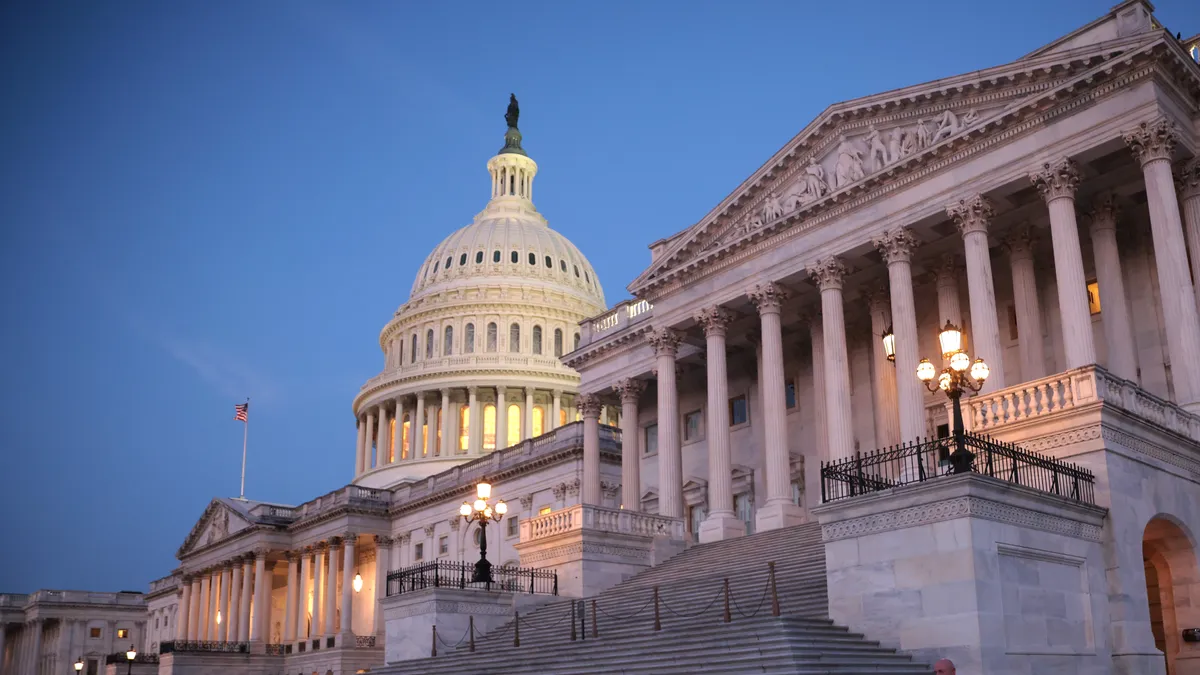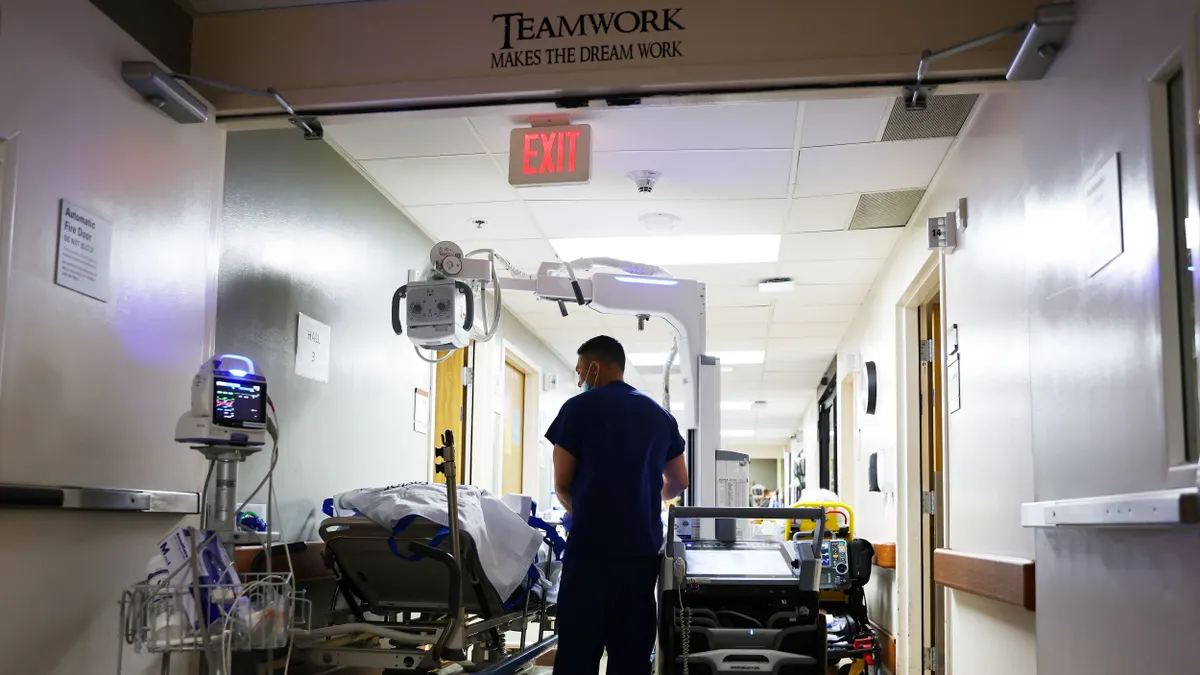Legislative News Round-UP
The Senate version included significant changes from the original House bill, and even from the chamber’s original drafts. It contains over $1 trillion in health care spending cuts, mostly from Medicaid. Key health care provisions (and changes) include:
- Provider Taxes: Retaining a freeze on all current provider taxes, and deepening the state provider tax cut by gradually reducing the cap by .5% per year, to a 3.5% final cap (the House bill had a 6% cap);
- State Directed Payments: Retaining a cap on new State Directed Payments (SDPs) at 100% of the Medicare rate for Medicaid expansion states and 110% of the Medicare rate for non-expansion states, and gradually dropping the allowed amount for existing SDPs (the House bill grandfathered existing SDPs at the average commercial rate);
- Eligibility: Retaining a limitation on ACA premium tax credit eligibility for only lawful, permanent residents, while dropping such limitations on basic health plan enrollees;
- Eligibility Checks: Retaining a requirement that Medicaid expansion beneficiaries recertify their eligibility every six months;
- Medicare Physician Payments: Narrowing a Medicare physician payment increase of 2.5% to apply only for 2026 (the House bill included a longer-term increase);
- Work Requirements: Expanding the work requirements in Medicaid to include parents of children 14 and older (the House bill excluded parents);
- Planned Parenthood: Retaining a prohibition on Medicaid funding for Planned Parenthood for one year;
- Rural Hospitals: Expanding a rural hospital fund to $50 billion and beginning disbursements two years earlier, in 2026;
- Gender-Affirming Care: Dropping a ban on gender-affirming care in Medicaid and the Children’s Health Insurance Program (CHIP);
- Undocumented Immigrants: Dropping a Federal Medical Assistance Percentage (FMAP) penalty for states using state-only funds to cover non-qualified immigrants; and
- Cost Sharing Reduction: Dropping a provision to resume Cost Sharing Reduction (CSR) funding, which would have eliminated the incentive for “silver loading”.
————————–
THE LATEST FROM POLITICO:
House Speaker Mike Johnson is staring down the legislative challenge of his career.
As soon as this morning, the speaker will attempt to ram the Senate-passed megabill through the House as dozens of Republicans threaten to vote it down. The detractors come from across the Republican conference after the Senate sent over a bill with deeper Medicaid cuts, steeper deficit hikes and less onerous clean-energy provisions than expected, as our Benjamin Guggenheim and Jordain Carney report.
And he’s gunning to deliver by President Donald Trump’s self-imposed July 4 deadline, as severe thunderstorms in Washington D.C. threaten full attendance (more on that below).
“We’ll see. I’ve got to play the cards that are dealt to me,” Johnson said Tuesday, after admitting he was “not happy” with the Senate’s changes to the bill. “And we’re working through that. … But we remain optimistic we’re going to land it at this point.”
Johnson has 24-to-48 hours to convince reluctant fiscal hawks and Medicaid moderates to swallow the Senate’s bill. He spent Monday on calls with concerned lawmakers and caucuses, scrambling to figure out how to pass it this week without making changes to the bill. (John Thune and Johnson have been in contact through much of the process but did not speak in the hours leading up to the Senate vote, the majority leader told Jordain.)
But the Senate bill will be tough to sell. House Freedom Caucus members like Reps. Chip Roy and Ralph Norman blasted the Senate’s bill Tuesday for adding to the deficit and softening clean energy tax credits. Roy and Norman both voted against the bill in the Rules Committee overnight.
House moderates are worried about the steep cuts to Medicaid, which Johnson has privately said could cost Republicans the House in 2026. Sen. Thom Tillis’ speech torching the Senate’s Medicaid provisions for similar reasons shook many vulnerable Republicans, our Meredith Lee Hill reports.
And a substantial cross section of the two groups of holdouts would rather take time to rework the package and send it back to the Senate, Meredith writes, instead of jamming the Senate version through the House under a self-imposed deadline. Norman said the House should go back to the original bill, leave town and come back when Senate Republicans are “serious.”
Some signs of progress for Johnson: Rep. Nick LaLota appeared more likely to support the bill Tuesday night after previously refusing a deal on a state-and-local tax deduction. Rep. Jeff Van Drew, previously a strong no on the bill over the Medicaid provider tax, told Mia a local provider tax tweak in the wraparound amendment for New Jersey and other states has him feeling better about the bill.
But it would still be a gamble for Johnson to put it on the House floor: Many Republicans think the bill would fail without additional changes. However, the speaker has previously succeeded in putting bills on the floor without the votes — and relying on Trump to pressure holdouts to fold.
———————————-
A federal judge today temporarily blocked much of the mass layoffs that plagued Department of Health and Human Services (HHS) staffers in March — ordering the Trump administration to cease plans to overhaul the department’s workforce.
U.S. District Judge Melissa DuBose in Rhode Island granted the preliminary injunction sought by a group of 19 attorneys general in a lawsuit filed in early May.
Her order bars the Trump administration from finalizing the layoffs or rolling out any further firings. It also directs HHS to provide a status report by July 11.
“The executive branch does not have the authority to order, organize, or implement wholesale changes to the structure and function of the agencies created by Congress,” DuBose wrote in her order.
Key context: Health Secretary Robert F. Kennedy Jr. purged the agency of more than 10,000 employees in late March, announcing the department would be consolidated and transformed into the Administration for a Healthy America.
HHS response: “HHS remains committed to modernizing a health workforce that for too long prioritized institutional preservation over meaningful public health impact,” said HHS spokesperson Andrew Nixon in a statement. “We are reviewing the decision and considering next steps.”
Here’s more on the preliminary injunction impacting HHS layoffs that would include various agencies under HHS including SAMHSA:
A federal judge in Rhode Island has halted mass layoffs and a major reorganization of the Department of Health and Human Services (HHS), siding with 19 Democratic state attorneys general who argued the changes were unconstitutional and illegal. The preliminary injunction blocks actions that began April 1, including the termination of 10,000 employees, office consolidations, and program eliminations. The plaintiffs cited halted CDC disease prevention efforts, disabled pregnancy data collection, and the FDA’s suspended youth tobacco compliance checks as examples of public harm. Judge Melissa Dubose ruled that the Executive Branch lacks authority to unilaterally restructure agencies created by Congress. The lawsuit also names top HHS officials, including Secretary Robert F. Kennedy Jr., and contends that states have lost access to critical data, guidance, and funding. The administration must submit a status report by July 11. (Article here)
REMINDER ABOUT WHAT HAPPENED AT HRSA AND SAMHSA EARLIER THIS YEAR:As many as 500 to 600 people were let go earlier this year at the Health Resources and Services Administration (HRSA), an agency charged with improving care for uninsured, rural, and low-income communities, said a person familiar with the cuts. HRSA funds community health centers, the Ryan White HIV/AIDS program, the organ donation and transplant system, the National Health Service Corps and programs promoting maternal and child health.
The Substance Abuse and Mental Health Services Administration lost about half of its nearly 900 employees, according to two people familiar with the process and one HHS employee. The overall objective was to reach pre-Covid staffing levels, one of them said.
Senior SAMHSA staff working to merge the agency into the new Administration for a Healthy America were laid off, the person said.
The director of SAMHSA’s Center for Mental Health Services, Dr. Anita Everett, was among them.
All of the agency’s 10 regional offices were closed, along with its external engagement team, the Office of Minority Health and the Office of Behavioral Health Equity, among others.
————————————
Senate passes Trump’s spending bill with massive Medicaid cuts
After a marathon “vote-a-rama,” the Senate narrowly passed the legislation 51-50, with Vice President JD Vance casting the tiebreaking vote.
Published July 1, 2025The Senate narrowly passed a massive tax and domestic policy bill on Tuesday that would likely cull millions of beneficiaries from the safety-net insurance program Medicaid.
The passage of the legislation — a major priority of President Donald Trump — is a success for Republicans, who’ve dodged a number of policy and political hurdles to get the bill to the finish line.
However, it was a battle to get passed. The Senate slogged through a “vote-a-rama,” where Democrats introduced a number of amendments urging lawmakers to reconsider the Medicaid cuts or boost support to rural hospitals, that began Monday and went through Tuesday midday.
The bill ultimately passed 51-50, after three Republicans, Sens. Rand Paul of Kentucky, Thom Tillis from North Carolina and Susan Collins from Maine, joined Democrats to vote against the package. Vice President JD Vance cast the tiebreaking vote. A similar uphill battle may lie ahead when the bill returns to the House.
The legislation includes several healthcare plans. Many of them center on Medicaid and have become some of the most hotly debated provisions.
Notably, it would require many adult beneficiaries in the safety-net insurance to log a minimum of 80 hours of work, volunteer or education hours a month to stay covered. States would also be required to check beneficiaries’ eligibility for Medicaid more frequently and implement cost-sharing for some services delivered to higher-income enrollees.
Additionally, the bill would freeze provider taxes — arrangements states use to finance their share of Medicaid funding — in states that haven’t expanded Medicaid, and gradually lower allowed rates in expansion states. This is a more aggressive policy than that proposed in the House and was a sticking point for some senators late into Monday evening, who worried rural hospitals in their district would be unable to survive the financial ramifications.
In an effort to woo those on the fence, lawmakers added a $25 billion fund to aid rural hospitals to the package. Late Monday night, Collins proposed doubling that amount to no avail.
“I am pleased that the bill contains a special fund that I proposed to provide some assistance to our rural hospitals, but it is not sufficient to offset the other changes in the Medicaid system,” Collins said on X after the vote.
In total, the reconciliation legislation would increase the number of uninsured people by 11.8 million people in 2034, according to an estimate released Saturday by the Congressional Budget Office. It would also increase the nation’s budget deficit by $3.3 trillion over the next decade.
The Senate’s bill cuts Medicaid more steeply than the lower chamber’s proposal — $100 billion more due to restrictions on provider taxes and state-directed payments that allow states to boost funding for Medicaid providers, according to an analysis by Manatt Health. Some House Republicans have raised concerns about the Senate’s text, arguing cuts to Medicaid are too steep.
The legislation additionally cuts Medicaid funding for a year for large abortion providers, restricts how Medicaid funds can be used to treat legal migrants and caps how much federal money states can receive if they use their own funds to provide healthcare for undocumented people.
The Senate also made changes to Medicare, including barring most immigrants from receiving services and removing a provision that would tie physician reimbursement rates to a measure of inflation.
The bill faced plenty of challenges in the upper chamber too. GOP senators worked through the weekend in an effort to get the reconciliation legislation to Trump’s desk by July 4, reworking parts of their proposal to appease the Senate parliamentarian and convince lawmakers skeptical about the deep cuts to Medicaid.
Democrat lawmakers staunchly oppose the bill, arguing it preserves tax cuts that benefit the wealthiest Americans while reducing funds for Medicaid and food assistance.
Read More in Payer
Want to see more stories in Payer?Read More ➔
“It’s the biggest Medicaid cut in history and represents the largest transfer of wealth in history,” Sen. Ron Wyden, D-Ore., said on the Senate floor Monday. “It is caviar over kids, hedge funds over healthcare, Mar-a-Lago over the middle class.”
The healthcare sector has been outspoken about the possible impacts of the legislation. Hospitals argue the Medicaid cuts will increase their burden of uncompensated care as the number of uninsured rise, hitting their bottom lines and forcing them to cut services.
“We are deeply disappointed by today’s vote in the United States Senate,” said American Hospital Association CEO Rick Pollack in a statement Tuesday. “The real-life consequences of these nearly $1 trillion in Medicaid cuts – the largest ever proposed by Congress – will result in irreparable harm to our health care system, reducing access to care for all Americans and severely undermining the ability of hospitals and health systems to care for our most vulnerable patients.”
The CEO warned hospitals could see longer wait times and may have to cut staff or close entirely, especially in rural areas.
Now, the bill will return to the House to gain approval. The Senate’s version is likely to face challenges from some conservative members who believe the bill has not gone far enough to cut costs.
“The Senate’s version adds $651 billion to the deficit — and that’s before interest costs, which nearly double the total,” the caucus said in a statement Monday, “That’s not fiscal responsibility. It’s not what we agreed to.”





